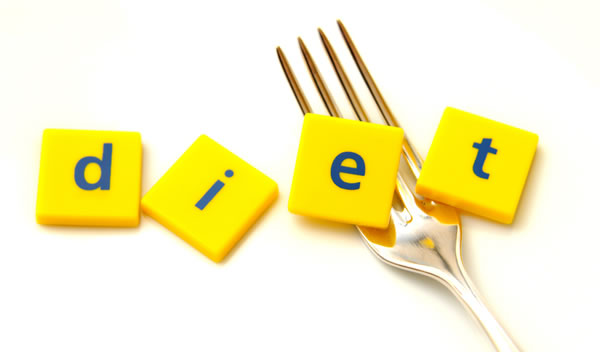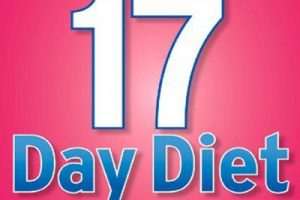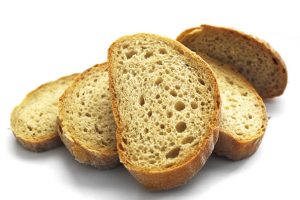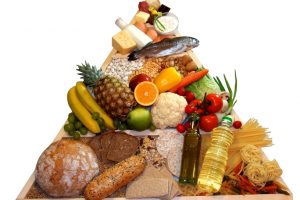The decision to lose weight is easy to make, but it is not always quite so easy to get started on a weight loss diet. There are so many diets promoted in the media that it is almost impossible to know where to start when beginning a diet for the first time. Many diets promise attractively fast weight loss, but often promote an unsustainable style of eating that can’t be continued in the long term.
Others offer more long term solutions, but rely heavily on calorie counting and seem to make every meal an exercise in maths Both of which can make following a diet a nightmare.
There is so much conflicting information on the internet, magazines and even according to weight loss experts that it can seem hugely daunting to take on a weight loss diet. Some sources say low carb is the way to go, whilst others swear by low fat. Others say fat is fine, as long as the type is right.
Fruit contains essential vitamins and minerals, but has too much sugar; olive oil is full of healthy antioxidants but also full of calories. It’s no wonder many dieters are pulling their hair out with frustration.
It is tempting to dive straight into the diet that promises the most weight loss in the fastest time, but it is important to remember when starting a diet for the first time is that the simpler the eating plan is, the easier it is to stick to and the more likely it is that you will achieve long term results.
You need to develop new long term healthy eating habits and steer clear of fads that may only produce rapid short term results. Remember that weight loss is unlikely to be consistent, some weeks you may lose more, others less and some weeks you may even gain weight. Don’t let this discourage you.
There are so many factors that affect our weight on a short term basis that it is more important to look at the overall long term picture. Persevere and you will see results eventually.
5 Diet rules for beginners
To help the first time dieter get started, here at some simple top tips to lose weight quickly (but still at a healthy rate).
1# Set realistic goals and stick to them
Healthy weight loss is considered to be 1-2 pounds per week. This may not sound like much, particularly if you are very overweight, but remember if you lose weight too fast, not only is it bad for your body, but you are unlikely to keep it off. It’s definitely a case of slow and steady wins the weight loss race!
To achieve weight loss in the healthy range you generally need to reduce your intake of food by 500 to 1000 calories per day. This could be done as simply as cutting out your two morning tea donuts, or perhaps by reducing portion sizes, or making healthy food swaps throughout the day.
Identifying foods high in caloriesand swapping them for low calorie alternatives can be a simple way to do this that eliminates excessive calorie counting. Swap biscuits for fruit, soft drink for flavoured water or diet drinks and you are well on your way to achieving this goal. Set yourself long term goal weights, and don’t sweat the small stuff. Weighing yourself every day is not productive and can give you the wrong impression.
Weigh yourself weekly at the most and set realistic goal weights for months rather than weeks. Take into account a healthy weight for your height and your body type when setting goals. Everyone is different and few of us will ever be the size of Kate Moss, no matter how many diets we follow.
Be aware of what types of eating patterns will fit into your life and you will find easier to follow. It is no good following an expensive meal replacement diet if you are on a budget, or eating ten small snacks a day if you have a hectic job that doesn’t allow you to stop to eat this many times. The easier you make your diet changes, the more likely you will achieve long term results.
2# Avoid drinking your calories
Calories consumed in drinks are often forgotten when considering a weight loss diet. Remember some drinks contain are unexpectedly high in calories. Steer away from sugary soft drinks, large milk drinks such as lattes, especially when made with full fat milk and definitely when topped with whipped cream and flavoured with syrups.
Remember alcohol is very high in calories, and provides little nutritional value. Not only is it easy to knock back a bottle of wine without really realizing it, you are more likely to eat more as well as a result of those alcohol induced munchies.
Although they may be a full of nutrients, juices are also high in calories, so it is important to limit your intake of these too. Also be aware that many other ‘healthy’ choices, such as smoothies can be high in calories due to their high content of sugar and large size.
3# Eat small frequent meals
Eating small, frequent meals rich stimulates your metabolism, meaning you burn calories more efficiently. Making these meals high in protein and complex carbohydrates also means you will be full longer and less likely to get very hungry and resort to unhealthy food choices or overeat at your next meal.
4# Choose low fat options
Most people know fat as enemy number one to the dieter, and they are not wrong. Fat has the highest number of calories per gram of any of the macro nutrients therefore if you reduce your fat intake, you will automatically reduce calories significantly. The simplest way to do this is to always choose low fat options.
In addition to this try to reduce fat added in cooking. Switch to low fat cooking techniques such as grilling and flavour with herbs and spices rather than fat. A small amount of healthy unsaturated fat such as olive oil is good for your heart, but keep it to a minimum to avoid those extra calories. Finally, limit your intake of the foods we all know are high in fat, chips, hamburgers, ice cream, you know the ones!
5# Burn more calories
For optimum weight loss, it is ideal not only to reduce the calories you eat, but also to increase the calories you burn. If the calories you eat are more than those you burn, you will gain weight. Conversely if you burn more calories than you eat you will lose weight. Therefore, to increase weight loss, the best option is to burn more and eat less, increasing the energy deficit.
Remember you do need calories for normal bodily function, so very low calorie diets are not recommended without medical supervision.
Find an exercise you enjoy, as you are more likely to stick to it. Also think about what fits into your daily routine and what you have time for. Don’t go for a sport just because it is an efficient calorie burner, it is much better to choose something you enjoy that burns less calories, but do it more often.
Try exercising in groups or with a friend to increase motivation, and remember to find any excuse to move. Take the stairs or walk to work, it all burns calories.
It is vital to remember however, that exercising does not give you the licence to eat whatever you want. Look into how much exercise is required to burn certain foods; it may be enough to stop you from eating them. The combination of a reduced calorie intake and an increased output is the quickest way to achieve successful weight loss.






